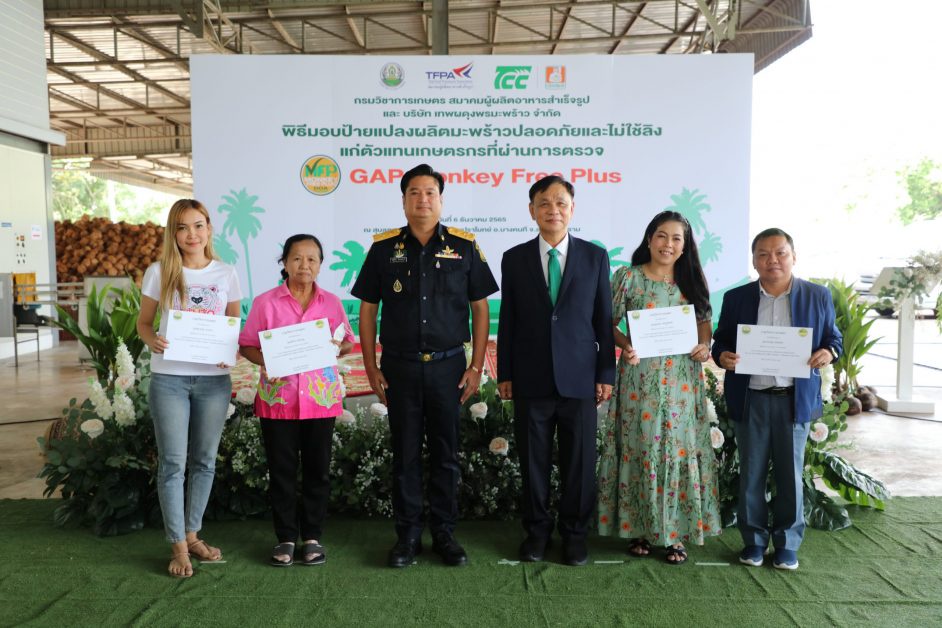The newly founded certification was introduced and presented by Mr. Rapeepat Chantarasriwong, Director-General of the Department of Agriculture, during the "Consultative Virtual Meeting on Thailand's Proposal for GAP Monkey Free Plus", a conference hosted by the International Coconut Community (ICC) to discuss processes that can ensure traceable coconut supply chains free of animal labor.
The GAP Monkey Free Plus certification has been developed to kickstart Thailand's efforts in implementing preventative measures against the use of monkey labor in the production process of coconuts for export. To gain this certification, coconut farmers must apply for an audit which will verify whether their farms are free of monkey-labor and comply with international agricultural standards.
As a leader in the coconut industry that values transparency, quality processes and standards free of monkey cultivation, TCC supported the Monkey Free Plus pilot program by joining staff from the Horticultural Research Institute, Plant Commodity Standards and System Development Division and Ratchaburi Agricultural Research and Development Center to assess some of the company's partner farms in Samut Sakhon province - all of which passed the audit and earned the certification. Moving forward, TCC will continue to work closely with the Department of Agriculture and encourage more partner coconut farms to apply for 'GAP Monkey Free Plus' certification, to positively drive the industry towards a fully monkey-free future and further provide assurance to international customers.
Committed to responsibly tracking and purchasing coconuts from reliable parties that comply with Thailand's animal welfare laws, in addition to the Monkey Free Plus program, TCC also implements industry-first internal and external audits - the latter conducted by reputable international auditor Bureau Veritas - which aim to evaluate the company's processes, as well as those of local farmers and suppliers. The internal audits and the first Bureau Veritas audit, which has successfully evaluated over 1000 farms across the four provinces TCC purchases coconuts from, including Samut Songkhram, Ratchaburi, Prachuap Khiri Khan and Nakhon Si Thammarat, confirmed that TCC's operations are free of monkey cultivation across its audited network in Thailand. Presently, the company continues to proactively extend its auditing requirements and is awaiting results from its ongoing second Bureau Veritas audit.
Furthermore, to ensure the highest quality and ethical standards, TCC has established several initiatives to pioneer and promote monkey-free cultivation across the sector. This includes the introduction of a MOU with distributors across the country, agreeing that all sourced coconut plantations must not use monkey labor. Currently, the MOU has been signed by distributors across various provinces working with more than 1,000 plantations, and TCC has pledged that if PETA finds any of its distributors using monkey labor, the company will immediately terminate its relationship with the implicated parties.
Beyond all the processes, TCC has also partnered with the Wildlife Friends Foundation (WFFT) to create an agricultural environment free of monkey exploitation in Thailand. This activity aids mistreated monkeys by establishing an effective rescue and rehabilitation system that enhances monkeys' quality of life and well-being. Further, to create a more modern and sustainable industry, TCC continues to provide dwarf coconuts, harvesting equipment, and education to farmers so their produce is always responsibly cultivated and manufactured.
With the right systems and actions in place, TCC hopes to pave the way for others and will continue working with the entire industry, including government sectors, to advance local agriculture towards a more innovative, ethical, and sustainable future.
Source: Hill+Knowlton Strategies
